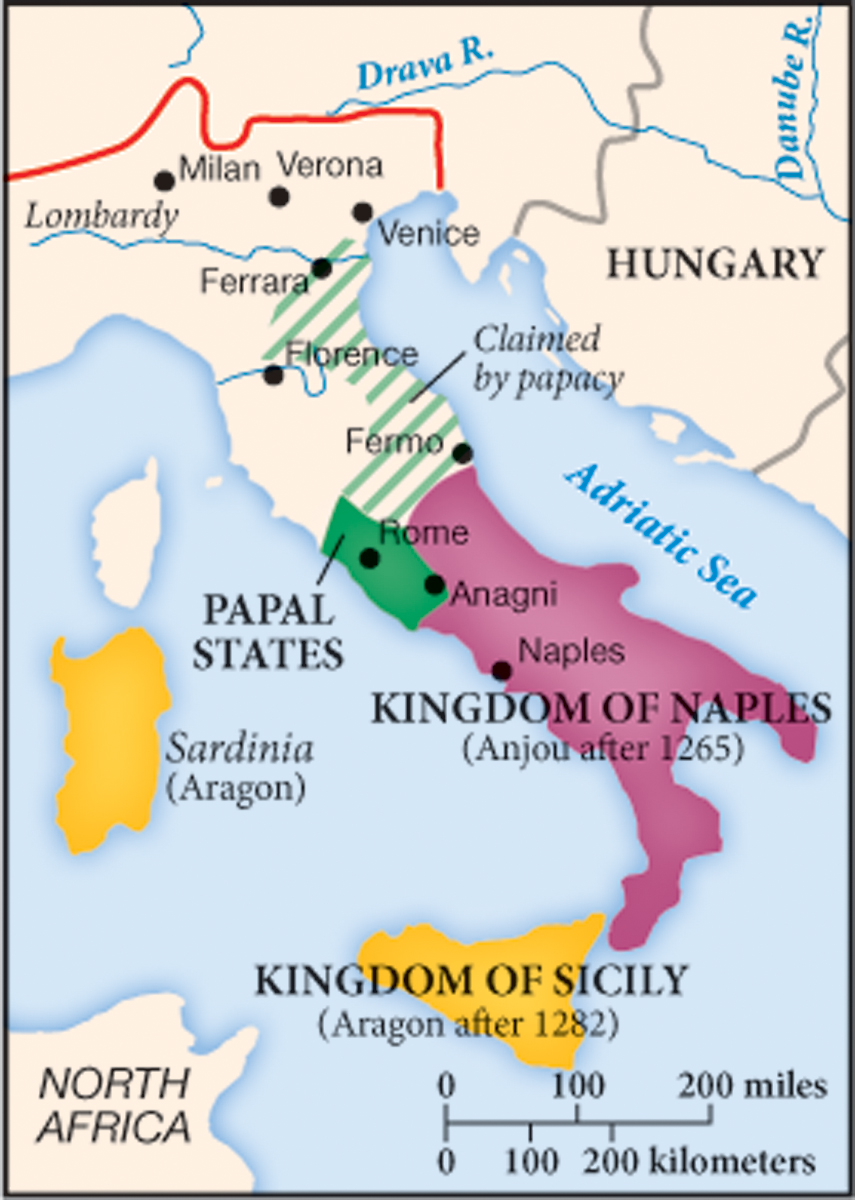The Weakening of the Empire
The Weakening of the Empire
During the thirteenth century, both popes and emperors sought to dominate Italy. After Barbarossa failed in his bid for northern Italy, (See “Germany: The Revived Monarchy of Frederick Barbarossa” in Chapter 11) his son Henry VI tried a new approach to gain Italy: he married Constance, the heiress of Sicily. With Sicily as a base, Henry hoped to make good his imperial title in Italy. But he died suddenly, leaving as his heir his three-year-old son. It was a perilous moment. The imperial office became the plaything of the German princes and the papacy. But Pope Innocent III miscalculated when, in 1212, he gave the imperial crown to Henry’s son, Frederick II (r. 1212–1250), now a young man ready to take up the reins of power.
Frederick was an amazing ruler: stupor mundi (“wonder of the world”) his contemporaries called him. Heir to two cultures, Sicilian on his mother’s side and German on his father’s, he cut a worldly and sophisticated figure. In Sicily, he moved easily within a diverse culture of Jews, Muslims, and Christians. Here he could play the role of all-powerful ruler. In Germany, he was less at home. There Christian princes, often churchmen with ministerial retinues, were acutely aware of their crucial role in royal elections and jealously guarded their rights and privileges.
Both emperor and pope needed to dominate Italy to maintain their power and position. The papacy under Innocent III was expansionist, gathering money and troops to make good its claim to the Papal States. The pope expected dues and taxes, military service, and the profits of justice from this region. To ensure the survival of the Papal States, the pope refused to tolerate any imperial claims to Italy.
Frederick, in turn, could not imagine ruling as an emperor unless he controlled Italy. He attempted to do this throughout his life, as did his heirs. Frederick had a three-pronged strategy. First, he revamped the government of Sicily to give himself more control and yield greater profits. His Constitutions of Melfi (1231), an eclectic body of laws, set up a system of salaried governors who worked according to uniform procedures. The Constitutions called for nearly all court cases to be heard by royal courts, regularized commercial privileges, and set up a system of taxation. Second, to ensure that he would not be hounded by opponents in Germany, Frederick granted them important concessions in his Statute in Favor of the Princes, finalized in 1232. These concessions allowed the German princes to turn their principalities into virtually independent states. Third, Frederick sought to enter Italy through Lombardy, as his grandfather had done.
Each of the four popes who ruled after Innocent died in 1216 followed Frederick’s every move and excommunicated the emperor a number of times. The most serious of these condemnations came in 1245, when the pope and other churchmen assembled at the Council of Lyon to excommunicate and depose Frederick, absolving his vassals and subjects of their fealty to him and forbidding anyone to support him. By 1248, papal legates were preaching a crusade against Frederick and all his followers. Frederick’s death, in 1250, ensured their triumph.
The fact that Frederick’s vision of the Empire failed is of less long-term importance than the way it failed. His concessions to the German princes allowed them to divide Germany into discrete principalities. (In fact, Germany would not be united as a nation until the nineteenth century.) Between 1254 and 1273, the princes kept the German throne empty. Splintered into factions, they elected two different foreigners, who spent their time fighting each other.

In one of history’s great ironies, it was during this low point of the German monarchy that the term Holy Roman Empire was coined, emphasizing its sacrality and power over Rome precisely when it was at its weakest. In 1273, the princes at last united and elected a German, Rudolf (r. 1273–1291), whose family, the Habsburgs, was new to imperial power. Rudolf used the imperial title to help him consolidate control over his own principality, Swabia, but he did not try to fulfill the meaning of the imperial title elsewhere. For the first time, the word emperor was freed from its association with Italy and Rome. For the Habsburgs, the title Holy Roman Emperor was a prestigious but otherwise meaningless honorific.
The failure of Frederick II in Italy meant that the Italian cities would continue their independent course. To ensure that Frederick’s heirs would not continue their rule in Sicily, the papacy called successively on other rulers to take over the island—first Henry III of England and then Charles of Anjou. Forces loyal to Frederick’s family turned to the king of Aragon (Spain). The move left two enduring claimants to Sicily’s crown—the kings of Aragon and the house of Anjou—and it spawned a long war that impoverished the region.
The popes won the war against Frederick, but at a cost. Even the king of France criticized the popes for doing “new and unheard-of things.” By making its war against Frederick part of its crusade against heresy, the papacy came under attack for using religion as a political tool.